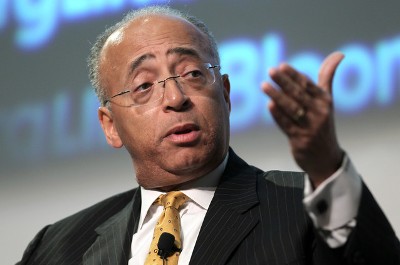Mayoral Candidates Weigh in on Tech Expansion: Bill Thompson
By Jotham Sederstrom August 6, 2013 1:00 pm
reprintsBill Thompson is the former comptroller of New York City and a mayoral candidate. A recent Quinnipiac poll found that Mr. Thompson is preferred by 20 percent of likely Democratic primary voters, narrowly trailing Bill de Blasio with 21 percent and Christine Quinn with 27 percent. In a Quinnipiac poll in mid-July, Mr. Thompson had only 11 percent of the vote. His recent success near the election date may prove that slow and steady actually does win the race. He spoke with Wired City last week about broadband and technology.
 Wired City: What are your overall feelings about NYC’s efforts to enter the tech scene?
Wired City: What are your overall feelings about NYC’s efforts to enter the tech scene?
Mr. Thompson: As mayor, I will make New York the most connected city in the world. Look around the world, and you’ll see why this is so important. In Kansas City, Missouri, Google is laying their Fiber network, providing super-high-speed broadband at a very low cost. That’s attracting innovators, entrepreneurs and jobs to their city. In Seoul, South Korea, the standard broadband access is at least 10 times as fast as ours—and only $20 a month. Again, that infrastructure advantage attracts thinkers and jobs.
What is the best way to fix our city’s infrastructure?
I will create a new deputy mayor of innovation and technology to transform the way the city supports and maintains technological development. The city has undertaken several large-scale projects to modernize governmental technology operations in recent years, but we need a more coordinated approach. I will charge the new deputy mayor to:
Unify a cloud computing system. Incorporating cloud technology throughout city government will allow the city to leverage economies of scale and reduce capital costs related to technology infrastructure and software licensing. A fully integrated cloud computing system will allow the city to improve continuity of operations planning, enable workers to access their work remotely, [and] reduce power usage, CO2 emissions and physical space requirements.
Oversee the planning and execution of large, complex and cross-agency projects. This step will help the city establish a more fair and competitive contracting process that incorporates smaller companies, startups and MWBEs. Wherever possible, unified platforms will be built, allowing for streamlined interaction with the public, minimizing bureaucratic redundancies, and making it easier for businesses and individuals alike to interact with the city. By building scalable, purpose-built systems that span multiple agencies, the city will not only reduce execution costs and time lines, it will also provide multi-agency solutions that are far more citizen-centric and government-worker-centric.
Recruit NYC Technology Fellows. As mayor, I will invite 10 of the city’s top technology innovators to help lead efforts to make New York the most technologically advanced city in the world. Following the model of President Obama’s Presidential Innovation Fellows program, NYC Technology Fellows will undertake a series of projects to modernize and reduce the costs of city services, support tech growth throughout the five boroughs and create low-cost technological solutions to help small businesses.
How can the city afford to invest in this new project?
It is estimated that the city spends nearly $2 billion a year on technology across agencies. As mayor, I will ensure that we use our dollars wisely and work to cut costs by increasing oversight on projects. Additionally, we will train our city work force and focus less on relying on outside consultants.
Connectivity in subways is terrible. Would you work on this if elected?
I will work to improve the connectivity of city subways. But the lack of connectivity in subways is indicative of a larger problem: New York’s lack of universally affordable access to broadband.
As mayor, I will lead the city’s efforts to make technology more accessible and affordable for every New Yorker.
Nearly 100 percent of residents and businesses can acquire broadband in the city. But many New Yorkers, particularly low-income and senior residents, have lagged behind in broadband adoption due to costs, and the available speeds are not sufficient for many new businesses.
As mayor, I will close that digital divide. I will partner with social enterprises and nonprofits to provide social equity and provide tax credits to businesses that boost accessibility. We’ll offer a $25,000 bonus to entrepreneurs, specifically those in STEM, who start businesses in Tech Empowerment Zones.
Just like the restaurant grading system, we will also use a Tech Grade System to ensure all New Yorkers have the best possible and most reliable connectivity. These letter grades will be based on cost, speeds, up/downtime and wait time for repairs for every ZIP code.



